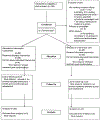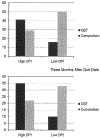Depression vulnerability moderates the effects of cognitive behavior therapy in a randomized controlled trial for smoking cessation
- PMID: 21035610
- PMCID: PMC7261491
- DOI: 10.1016/j.beth.2009.10.001
Depression vulnerability moderates the effects of cognitive behavior therapy in a randomized controlled trial for smoking cessation
Abstract
Several clinical trials have tested the hypothesis that smoking cessation treatments with a mood management component derived from cognitive behavior therapy (CBT) for depression would be specifically effective for depression-vulnerable smokers, with mixed results. This trial addressed methodological concerns with some of the previous studies to clarify whether depression vulnerability does in fact moderate CBT smoking cessation outcome. The study compared 8-session group CBT with a time-matched comparison group condition in a sample of 100 cigarette smokers randomized to treatment condition. Each treatment group was led by one of 7 American University clinical psychology graduate students; therapists were crossed with treatment conditions. Outcome (7-day point prevalence abstinence) was evaluated 1 month and 3 months after quit date. Baseline self-reported depression vulnerability (sample median split on the Depression Proneness Inventory) moderated treatment response, such that more depression-prone smokers fared better in CBT whereas less depression-prone smokers fared better in the comparison condition. These results may have implications for determining when to use CBT components in smoking cessation programs.
Copyright © 2010. Published by Elsevier Ltd.
Figures


References
-
- Acierno RA, Kilpatrick DG, Resnick HS, Saunders BE, & Best CL (1996). Violent assault, posttraumatic stress disorder, and depression: Risk factors for cigarette use among adult women. Behavior Modification, 20, 363–384. - PubMed
-
- Alloy LB, Hartlage S, Metalsky GI, & Abramson LY (1987). The Depression Proneness Inventory: A brief, face-valid scale of vulnerability to depressive reactions in response to stress. Unpublished manuscript, Temple University Philadelphia, PA.
-
- Altman DG (1998). Adjustment for covariate imbalance In Armitage P & Colton T (Eds.), Encyclopedia of biostatistics (pp. 1000–1005). New York: John Wiley & Sons.
-
- Beck AT, Rush AJ, Shaw BF, & Emery G (1979). Cognitive therapy of depression. New York: Guilford Press.
-
- Beck A, Steer R, & Ranieri W (1988). Scale for suicide ideation: Psychometric properties of a self-report version. Journal of Clinical Psychology, 44, 499–505. - PubMed
Publication types
MeSH terms
Grants and funding
LinkOut - more resources
Full Text Sources
Medical

